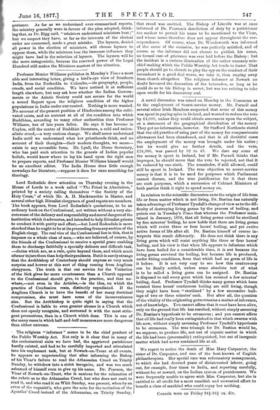Lord Redesdale drew attention on Thursday evening in the House
of Lords to a work called "The Priest in Absolution," printed by a society calling themselves "the Society of the Holy Cross," of which Mr. A. H. Mackonochie is Master, and several other high Ritualist clergymen of good repute are members. '.['he book appears, from Lord Redesdale's quotations, to be an ordinary book on the Confessional, not written without a very sin- cere sense of the delicacy and responsibility andmoral dangers of the institution which itadvocates, and intended to help Ritualist priests to conduct it with purity and effect,—but Lord Redesdale is more shocked than he ought to be at its proceeding fromany section of the English clergy. The real vice of the Confessional lies in this, that it imposes on a whole class of men,—who are believed, of course, by the friends of the Confessional to receive a special grace enabling them to discharge faithfully a specially delicate and difficult task, —duties which are, as a rule, quite beyond them, and which much -oftener injure them than help theirpenitents. Butit is surely strange that the Archbishop of Canterbury should express so very much surprise and horror at this sort of thing coming from Anglican -clergymen. The truth is that our service for the Visitation -of the Sick gives far more countenance than a Church opposed to the Confessional should give, to the practice, and that no- where,—not even in the Articles,—is the idea, on which the practice of Confession rests, distinctly repudiated. If the Anglican Church is to have the benefit of her many doctrinal compromises, she mast have some of the inconveniences also. But the Archbishop is quite right in saying that the Confessional is liable to even greater abuses in a Church which does not openly recognise, and surround it with the most strin- gent precautions, than in a Church which does. This is one of the many cases in which half-and-half measures are more dangerous than either extreme.


































 Previous page
Previous page